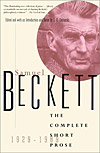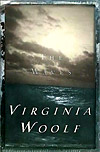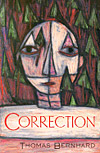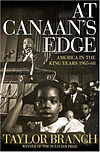
The Known World
By Edward P. Jones
Edward P. Jones is old-school. Like Dostoyevsky, Dickens, Faulkner, Hurston, Austen, Ellison are old-school. Master setters of scene, possessors of startling psychological acuity, storytelling writers whose best prose achieves a nearly seamless representational realism. Old-school writers endure because their insights into people's hearts, their meticulous observations of nature and society seem taken directly from the eternal Wheel of Life human beings have been riding and getting tossed off of before the beginning of recorded history. Plot-driven, compelling narratives compounded of slices of felt life: Yes, yes, the reader hollers, that's just how it goes.
To begin to understand slavery and free ourselves from its evil legacy, Jones tells us, we must not only attempt to put ourselves in a slave's shoes (or no shoes) but also imagine owning slaves or being a slave's slave or a slave master who once was a slave. Like all old-school writers, Jones reminds us that until our time on earth ends, the best we can hope for is gradual emancipation from desires of body and soul enslaving us.
By Edward P. Jones
Edward P. Jones is old-school. Like Dostoyevsky, Dickens, Faulkner, Hurston, Austen, Ellison are old-school. Master setters of scene, possessors of startling psychological acuity, storytelling writers whose best prose achieves a nearly seamless representational realism. Old-school writers endure because their insights into people's hearts, their meticulous observations of nature and society seem taken directly from the eternal Wheel of Life human beings have been riding and getting tossed off of before the beginning of recorded history. Plot-driven, compelling narratives compounded of slices of felt life: Yes, yes, the reader hollers, that's just how it goes.
To begin to understand slavery and free ourselves from its evil legacy, Jones tells us, we must not only attempt to put ourselves in a slave's shoes (or no shoes) but also imagine owning slaves or being a slave's slave or a slave master who once was a slave. Like all old-school writers, Jones reminds us that until our time on earth ends, the best we can hope for is gradual emancipation from desires of body and soul enslaving us.

Samuel Beckett: The Complete Short Prose, 1929–1989
A Beckett story possesses the tangibility, the inscrutability of fleeting thoughts, of fleeting sensations and emotions. His fictions create a haunting reality, though you may never be quite sure what's happening because the language of a Beckett story is disembodied; it supplies few of the referents and props that are the staples of conventional fiction. Instead the reader is stitched into a slightly out of focus tapestry of words, both familiar and strangely elusive, and hears the recognizable mumble of those voices inside our minds, the sea of language we inhabit, always present in the background, buoying, releasing, drowning the words we seek to make sense of the world, the utterances we're almost ready to speak aloud or others speak at us but never quite get right. As if there's truly nothing but this ebbing and rising white noise of words, this ocean, this forest of language somewhere out there and you're on a bare stage like in a Beckett play and the whole universe has fallen away (or you've fallen from it); not much time left or all the time in the world remains and here you are alone, or perhaps with another you wish for or wish away, who's summoned by your shudders, sermons, cries, or belly laughs to keep you company before no one, anywhere, ever listens again.
A Beckett story possesses the tangibility, the inscrutability of fleeting thoughts, of fleeting sensations and emotions. His fictions create a haunting reality, though you may never be quite sure what's happening because the language of a Beckett story is disembodied; it supplies few of the referents and props that are the staples of conventional fiction. Instead the reader is stitched into a slightly out of focus tapestry of words, both familiar and strangely elusive, and hears the recognizable mumble of those voices inside our minds, the sea of language we inhabit, always present in the background, buoying, releasing, drowning the words we seek to make sense of the world, the utterances we're almost ready to speak aloud or others speak at us but never quite get right. As if there's truly nothing but this ebbing and rising white noise of words, this ocean, this forest of language somewhere out there and you're on a bare stage like in a Beckett play and the whole universe has fallen away (or you've fallen from it); not much time left or all the time in the world remains and here you are alone, or perhaps with another you wish for or wish away, who's summoned by your shudders, sermons, cries, or belly laughs to keep you company before no one, anywhere, ever listens again.

The Waves
By Virginia Woolf
This is a novel about writing and time, about how we desperately endeavor to inscribe moments in our consciousness, using words to record, shape, and remember our lives. Even as our lives, alienated from us by vast, incomprehensible distance, ebb and flow relentlessly like the ocean's ceaseless breaking on the shore. Following a group of bright British students from their childhood days together at school through the years in which they begin to mature, decline, then die, Woolf asks how is any of this possible…what could it mean…do we possess faculties of mind or body to address this soaring, this falling and drowning, this obliteration and return in time…. "How I distrust neat designs of life that are drawn upon half-sheets of notepaper. I begin to long for some little language such as lovers use, broken words, inarticulate words, like the shuffling of feet on the pavement."
By Virginia Woolf
This is a novel about writing and time, about how we desperately endeavor to inscribe moments in our consciousness, using words to record, shape, and remember our lives. Even as our lives, alienated from us by vast, incomprehensible distance, ebb and flow relentlessly like the ocean's ceaseless breaking on the shore. Following a group of bright British students from their childhood days together at school through the years in which they begin to mature, decline, then die, Woolf asks how is any of this possible…what could it mean…do we possess faculties of mind or body to address this soaring, this falling and drowning, this obliteration and return in time…. "How I distrust neat designs of life that are drawn upon half-sheets of notepaper. I begin to long for some little language such as lovers use, broken words, inarticulate words, like the shuffling of feet on the pavement."

Correction
By Thomas Bernhard
The meaning of newspaper headlines depends on a reader's previous knowledge of a continuing story. If you're not in the know, not familiar with language that has been evolving days, weeks, months, headlines are often unintelligible. In a way, the meaning of any story is a kind of weight. Sometimes the weight and authority accumulates for no good reason beyond the fact perhaps that a story is repeated. Repetition breeds familiarity. Momentum develops. Readers are engaged, driven by curiosity about what the next retelling will add. Paradoxically, this thrust forward is also propelled by memory, a longing for the story to complete itself, return to an innocence that doesn't require further examination. The Austrian novelist Thomas Bernhard embodies this dynamic of weight, meaning, and memory in his narratives. His XXL-size sentences expand to paragraphs, pages, chapters. Obsessed, it seems, he repeats a word, phrase, a fixed idea, each reiteration almost indistinguishable from the last, yet always gathering force. Little by little, with supernatural patience, prodigious cunning and craft—like Joseph Heller in Catch-22—Bernhard fashions an original angle of vision that transforms our understanding. We see elephants beside us in a room where no one mentions elephants.
By Thomas Bernhard
The meaning of newspaper headlines depends on a reader's previous knowledge of a continuing story. If you're not in the know, not familiar with language that has been evolving days, weeks, months, headlines are often unintelligible. In a way, the meaning of any story is a kind of weight. Sometimes the weight and authority accumulates for no good reason beyond the fact perhaps that a story is repeated. Repetition breeds familiarity. Momentum develops. Readers are engaged, driven by curiosity about what the next retelling will add. Paradoxically, this thrust forward is also propelled by memory, a longing for the story to complete itself, return to an innocence that doesn't require further examination. The Austrian novelist Thomas Bernhard embodies this dynamic of weight, meaning, and memory in his narratives. His XXL-size sentences expand to paragraphs, pages, chapters. Obsessed, it seems, he repeats a word, phrase, a fixed idea, each reiteration almost indistinguishable from the last, yet always gathering force. Little by little, with supernatural patience, prodigious cunning and craft—like Joseph Heller in Catch-22—Bernhard fashions an original angle of vision that transforms our understanding. We see elephants beside us in a room where no one mentions elephants.

Black Skin, White Masks
By Frantz Fanon
In 1955, I was 14, Emmett Till's age when he was murdered that year in Mississippi. The photo of his dark, mutilated face in Jet magazine mirrored my face, one more proof of how race terrorizes. Race was like weather, a force of nature. You could run, but you couldn't hide.
I didn't know about Frantz Fanon then, but he had recently published this book, a study of race unlike any that had come before. Its premise is that race is a pernicious, crippling fiction constructed to rationalize and sanction a group's control and exploitation of other groups. Fanon—psychiatrist, freedom fighter, a French-speaking, colonized subject of African descent born on the Caribbean island of Martinique—views race as the product of a kind of mental illness, a false consciousness treatable—perhaps; curable by drastic doses of reason and difficult, enlightened choices—maybe. Not conceiving of ourselves in racial terms would turn the world topsy-turvy and force us to generate, according to Fanon, a new definition of "human." This is the creative, violent upheaval Fanon imagines, the violence Fanon's critics label as hate and racism. "Make of me a person who always questions," Fanon implores.
By Frantz Fanon
In 1955, I was 14, Emmett Till's age when he was murdered that year in Mississippi. The photo of his dark, mutilated face in Jet magazine mirrored my face, one more proof of how race terrorizes. Race was like weather, a force of nature. You could run, but you couldn't hide.
I didn't know about Frantz Fanon then, but he had recently published this book, a study of race unlike any that had come before. Its premise is that race is a pernicious, crippling fiction constructed to rationalize and sanction a group's control and exploitation of other groups. Fanon—psychiatrist, freedom fighter, a French-speaking, colonized subject of African descent born on the Caribbean island of Martinique—views race as the product of a kind of mental illness, a false consciousness treatable—perhaps; curable by drastic doses of reason and difficult, enlightened choices—maybe. Not conceiving of ourselves in racial terms would turn the world topsy-turvy and force us to generate, according to Fanon, a new definition of "human." This is the creative, violent upheaval Fanon imagines, the violence Fanon's critics label as hate and racism. "Make of me a person who always questions," Fanon implores.

At Canaan's Edge
By Taylor Branch
Reading At Canaan's Edge, Taylor Branch's final installment of "America in the King Years," caused me to second-guess a choice I made once upon a time. I'm not sure I would have served out my three years as a Rhodes scholar at Oxford if I'd read this book before I left for England in 1963. Of course, that's an easy, even silly thing to say now, but sobering waves of nostalgia, regret, and loss hit me as Branch chronicled—dramatically, poignantly, gratitude and wonder mingled painfully with bitterness—what I'd missed by choosing to live abroad. Branch tells King's story so it's LBJ's story, the story of Vietnam, the story of a people divided by class, race, gender, and war, the story of a nation squandering its resources, its ideals, refusing finally a golden opportunity of healing itself peacefully. We couldn't see past Martin Luther King's color to the principles of nonviolent witness, nonviolent liberation he personified. Instead we choose the shackles of race, the dead end of power, profit, privilege. Could I have made a difference. Could you. What about now.
By Taylor Branch
Reading At Canaan's Edge, Taylor Branch's final installment of "America in the King Years," caused me to second-guess a choice I made once upon a time. I'm not sure I would have served out my three years as a Rhodes scholar at Oxford if I'd read this book before I left for England in 1963. Of course, that's an easy, even silly thing to say now, but sobering waves of nostalgia, regret, and loss hit me as Branch chronicled—dramatically, poignantly, gratitude and wonder mingled painfully with bitterness—what I'd missed by choosing to live abroad. Branch tells King's story so it's LBJ's story, the story of Vietnam, the story of a people divided by class, race, gender, and war, the story of a nation squandering its resources, its ideals, refusing finally a golden opportunity of healing itself peacefully. We couldn't see past Martin Luther King's color to the principles of nonviolent witness, nonviolent liberation he personified. Instead we choose the shackles of race, the dead end of power, profit, privilege. Could I have made a difference. Could you. What about now.




